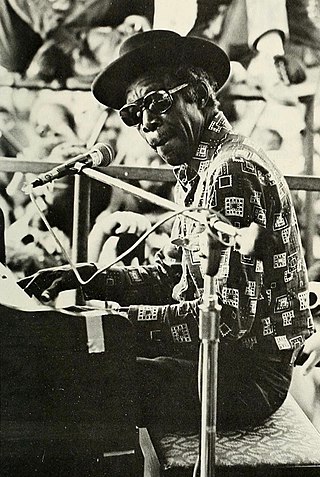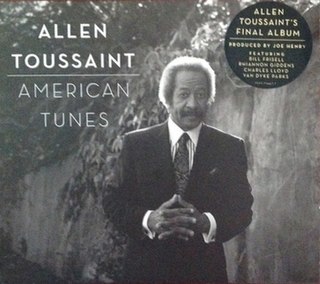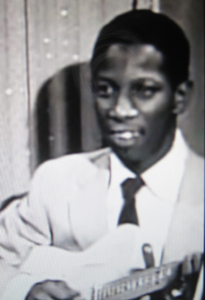Related Research Articles

Henry Roeland "Roy" Byrd, better known as Professor Longhair or "Fess" for short, was an American singer and pianist who performed New Orleans blues. He was active in two distinct periods, first in the heyday of early rhythm and blues and later in the resurgence of interest in traditional jazz after the founding of the New Orleans Jazz and Heritage Festival in 1970. His piano style has been described as "instantly recognizable, combining rumba, mambo, and calypso".
Willie Hall, best known by his nickname Drive 'Em Down, was a New Orleans blues and boogie woogie piano player. He never recorded, but has had a great influence on blues and rock and roll.

Allen Richard Toussaint was an American musician, songwriter, arranger, and record producer. He was an influential figure in New Orleans rhythm and blues from the 1950s to the end of the century, described as "one of popular music's great backroom figures." Many musicians recorded Toussaint's compositions. He was a producer for hundreds of recordings: the best known are "Right Place, Wrong Time", by longtime friend Dr. John, and "Lady Marmalade" by Labelle.
Galactic is an American funk band from New Orleans, Louisiana.
Maison de Soul is a Louisiana-based Zydeco and blues record label. It was founded in 1974 in Ville Platte, Louisiana by Floyd Soileau and remains under his ownership. It is one of four record labels under Soileau's Flat Town Music Company umbrella, and combined the Flat Town labels make up "the largest body of Cajun, zydeco, and swamp music in the world". Living Blues magazine has called Maison de Soul "the country's foremost zydeco label".
Huey Pierce "Piano" Smith was an American R&B pianist whose sound was influential in the development of rock and roll.
"The Fat Man" is a song by American rhythm and blues recording artist Fats Domino. It was written by Domino and Dave Bartholomew, and recorded on December 10, 1949. It is often cited as one of the first rock and roll records or at least a strong influence on the genre. This was a "rollicking" song, according to The Guardian "but what made it a rocker was Fats's barrelling piano triplets, combined with a solid big beat".
Robert Parker was an American R&B singer. His sole hit was "Barefootin'" (1966), and he is considered a one-hit wonder.

"Tipitina" is a song written and made famous by Professor Longhair. The song has been widely covered and the Professor Longhair version was recorded in 1953 for Atlantic Records. "Tipitina" was first released in 1953. A previously unreleased alternate take was released on the album New Orleans Piano in 1972. Although the nature of his contributions are unknown, recording engineer Cosimo Matassa is listed as the song's co-writer along with Roy Byrd, Professor Longhair's legal name.

"Mardi Gras Mambo" is a Mardi Gras-themed song written by Frankie Adams and Lou Welsch. The song's best known version was recorded in 1954 by the Hawketts, whose membership included Art Neville, a founding member of the Meters and the Neville Brothers. It is one of the iconic songs frequently played during the New Orleans Mardi Gras.

Joseph "Smokey" Johnson Jr. was an American drummer. He was one of the musicians, session players, and songwriters who served as the backbone for New Orleans' output of jazz, funk, blues, soul, and R&B music.

Al "Carnival Time" Johnson is an American singer and piano player best known for the Mardi Gras song "Carnival Time".

Ric Records, along with sister label Ron Records, were American record labels formed by Joe Ruffino in 1959. Although most of Ric's releases did not rise above regional hits, the label was active during the golden era of New Orleans R&B and was an incubator for many artists who are now recognized as definers of the style.
"Carnival Time" is a New Orleans Mardi Gras-themed R&B song that was performed by Al Johnson and recorded in 1960. The song's composition was originally credited to Al Johnson and Joe Ruffino, though Johnson now holds exclusive rights. It is now considered an iconic festive song of the New Orleans Carnival season.

American Tunes is the final recording from New Orleans jazz and R&B pianist Allen Toussaint, released on Nonesuch Records on June 10, 2016. It was produced by Joe Henry and includes music from a 2013 solo session at the pianist's home studio in New Orleans and an October 2015 session featuring musicians Bill Frisell, Charles Lloyd, Greg Leisz, Jay Bellerose, and David Piltch, with special guest vocalist Rhiannon Giddens and pianist Van Dyke Parks, recorded in Los Angeles the month before Toussaint died.

Walter Charles Nelson Jr., known as Walter "Papoose" Nelson, was an American R&B guitarist, best known for playing with Fats Domino, and on many of his hit records.

John Mortimer Boudreaux, Jr. was an American drummer who was active in jazz, soul, and rhythm & blues idioms.

Senator Nolan Jones was an American record company owner, producer, singer, and songwriter who worked in R&B and blues. He recorded and promoted Louisiana and Mississippi performers and songs for more than four decades.
References
- ↑ "Fats Domino - Mardi Gras in New Orleans".
- 1 2 3 4 5 6 7 Spera, Kieth (February 1, 2012). "Professor Longhair: The Times-Picayune covers 175 years of New Orleans History". Nola.com. NOLA Media Group. Retrieved December 1, 2015.
- 1 2 3 Dahl, Bill. "Professor Longhair: Artist Biography". Allmusic. All Media Network, LLC. Retrieved December 1, 2015.
- 1 2 3 Hannusch, Jeff (February 1, 2010). "Meet De Boys". OffBeat. OffBeat Magazine. Retrieved December 1, 2015.
- ↑ "Go To The Mardi Gras Lyrics". MetroLyrics. CBS Interactive Inc.
{{cite web}}: Missing or empty|url=(help) - ↑ "Professor Longhair 78 RPM - Discography - USA - 78 RPM".
- ↑ "Professor Longhair - the Chronological Professor Longhair: 1949". Discogs . 2001.
- 1 2 "Professor Longhair – Go To The Mardi Gras / Everyday, Everynight". Discogs. Discogs®. Retrieved December 1, 2015.
- ↑ "Professor Longhair - Mardi Gras in Baton Rouge". Discogs . 1991.
- ↑ "Professor Longhair - Rock 'N' Roll Gumbo". Discogs . 19 November 2018.
- ↑ "Various - the Devil's Music". Discogs . 2002.